Tincture
WARNING: Do not cite this page as a reference. This page is on this wikispace only to make the content "searchable" and easier to find. If you find the information you seek here, go to the original sources as linked below to verify the information and use them for your documentation.
See also:[edit | edit source]
Glossary of Terms[edit | edit source]
http://heraldry.sca.org/coagloss.html
Tincture:[edit | edit source]
A tincture is one of the seven standard hues used in Society armory, or a fur. The tinctures are the colors azure, gules, purpure, sable, and vert and the metals argent and Or. Furs include the ermined furs and vair, potent, scaly, papelonny, and their variations. See also Color, Ermined Tinctures, Furs, Metal, Proper Tincture, Rule of Tincture, Contrast
Metal:[edit | edit source]
In Society heraldry, the metals are argent and Or. Furs that use metals as underlying tinctures, such as ermine and erminois, are treated as metals for contrast. See also Color, Furs, Tinctures.
Neutral Tincture:[edit | edit source]
A term used to refer to fields or charges equally divided of a color and a metal. Elements that are neutral are generally considered to have good contrast with colors and metals so long as they do not share any tincture. For example, a field per pale sable and argent has good contrast with a bordure gules, but not with a bordure sable. See also Color, Furs, Metal, Tincture.
Or:[edit | edit source]
In blazon the tincture yellow or gold. By convention, the tincture Or is capitalized in SCA blazons.
http://heraldry.sca.org/coagloss.html
SENA A.3.A.2. Fieldless Designs:[edit | edit source]
A special subset of fieldless designs is tinctureless designs. These designs are those which do not specify a tincture for the charge or background, such as the English badge, (Tinctureless) A pheon. These designs may only be registered as seals for the use of principal heralds of kingdoms, although some earlier registrations to individuals exist.
A Heraldic Primer: Tinctures [old version][edit | edit source]
http://heraldry.sca.org/primer/tinctures.html (new version - New Heraldic Primer (aka Heraldry for Non-Heralds) - http://heraldry.sca.org/armory/newprimer/h4f2.shtml )
Basic Tinctures[edit | edit source]
The heraldic palette consist of seven basic tinctures: white/silver, blue, red, yellow/gold, purple, black, and green. But these names are never used in heraldry. Instead, special heraldic names are used:
| Argent (= white or silver) | Azure (=blue) | Gules (=red) | Or (=yellow or gold) |
|
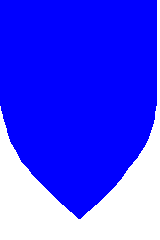
|
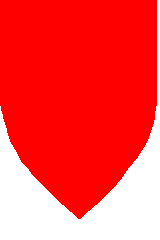
|
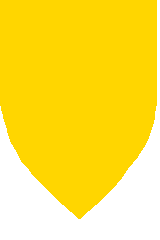
|
| Purpure (=purple) | Sable (=black) | *Vert (=green) | |

|

|
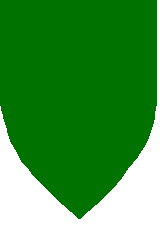
|
Colors and Metals[edit | edit source]
The basic tinctures are classified according to whether they are colors (dark) or metals (light).
- Or and argent are metals.
- Azure, gules, purpure, sable, and vert are colors.
Furs[edit | edit source]
There are several tinctures that are actually stylized patterns, classified as furs. These include:
| Ermine | Counter-ermine | Erminois | Pean |
| argent with "tails" (originally from an ermine's hide) sable | sable with "tails" argent | Or with "tails" sable | sable with "tails" Or |
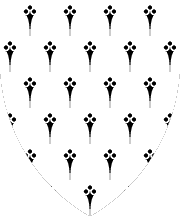
|
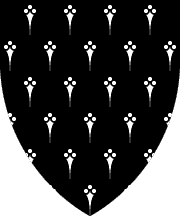
|
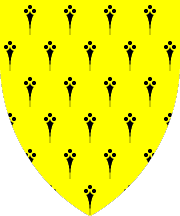
|
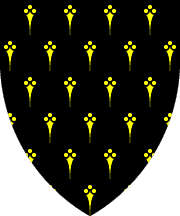
|
| Vair | Potent |
| interlocking "bells" (originally squirrel hides) alternately argent and azure | interlocking "T's" alternately argent and azure |
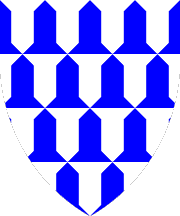
|
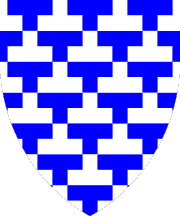
|
Miscellaneous Tinctures/Stains[edit | edit source]
The following tinctures are seen uncommonly, especially in heraldry before 1600. These tinctures are not suitable for registration in SCA Heraldry<. Their usage, however, is common enough in modern mundane heraldry to warrant mention here.
- bleu-celeste(=sky-blue),
- brunatre(=brown),
- cendree(=cinder-grey),
- murrey(=mulberry/purplish red),
- rose(=pink),
- sanguine(=dark blood-red), and
- tenné (=tawny orange).
Most of the miscellaneous tinctures are classified as stains, that is, neither color nor metal nor fur. http://home.comcast.net/~cwest222/heraldicprimer/tinctures.html
Rule of Tincture aka Color on Color Rule[edit | edit source]
http://heraldry.sca.org/laurel/lessons/lesson01.html
Simply, the Rule of Tincture says that "good contrast" must exist between the field and the charges upon it, or between a charge and the charges on it. Good contrast exists between:
- A metal and a color
- An element equally divided of a color and a metal and any other element, provided identifiability is maintained
- A color and a charge blazoned proper that is predominantly light
- A metal and a charge blazoned proper that is predominantly dark
Computer Color and Tincture Mapping[edit | edit source]
Precedents:[edit | edit source]
Precedents of the SCA College of Arms - http://heraldry.sca.org/laurel/precedents.html
Morsulus Heralds Website - http://www.morsulus.org/ (to search the LoARs and Precedents)
Use the above links to be sure any precedents listed below haven't been superseded by newer precedents.
Definition:[edit | edit source]
Registerability:[edit | edit source]
(Restricted, Reserved, SFPP, OOP)
April 2012 - Tinctures and Other Descriptive Words in Order Names and Heraldic Titles:[edit | edit source]
In January 2012, we asked commenters to consider the current precedent regarding the use of color words in order names. In February 2003, Pelican ruled that "no evidence has been found that heraldic tinctures (rather than common color terms such as bleu) were used in order names." Since that time, our knowledge of period order names and heraldic titles has expanded considerably, in large part due to articles like my "Heraldic Titles from the Middle Ages and Renaissance" (found at http://medievalscotland.org/jes/HeraldicTitlesSCA/index.shtml) and my "Medieval Secular Order Names" (found at http://medievalscotland.org/jes/OrderNames/ or at http://heraldry.sca.org/laurel/names/order/new/).
The color terms used in order names and heraldic titles are summarized in the May 2009 Cover Letter. They are the everyday terms for heraldic tinctures, mostly in French, but also in German, English, and Spanish. Several French terms are identical to the terms used for heraldic tinctures, including vert, or, and argent (which is found in sign names but not order names). This means that half the colors used in order names (vert, or and argent) are at least sometimes identical to the heraldic terms. Even vaire is found in French inn signs. Similarly, early blazon seems to have sometimes used the everyday color terms rouge and noir. Given the variability in the use of heraldic and everyday terms, and the confusion this causes for submitters and commenters, we are hereby allowing the use of heraldic color terms in order names as well as the everyday terms. However, no convincing evidence has been presented for the use of non-heraldic color names, including the names for particular shades of a color, like scarlet or crimson.
There was relatively little commentary on the use of terms for posture and orientation. As such, we will not at this time rule on whether the patterns found for such terms in inn sign names should be extended to order names and heraldic titles. The question will be revisited when a relevant submission appears. http://heraldry.sca.org/loar/2012/04/12-04cl.html
June 2011 - multiply-tinctured group:[edit | edit source]
[#162] Lillian atte Valeye. Device. Or, in bend a fleur-de-lys inverted sable between a fleur-de-lys vert and a fleur-de-lys purpure, in chief three bells sable. This device is returned for multiple reasons... The device is also returned for being two steps from period practice, formerly called 'weirdnesses'. One step was mentioned on the Letter of Intent:
- Questions were raised regarding having...three roundels in three different tinctures. While were unable, in a quick look, to find an example of the same charge in three different tinctures, the Dictionary of British Armory, 2 shows the arms of Milo Fitzwalter of Glouster as Gules, two bends the upper Or and lower argent, making the use of the same change in three different tinctures only one weirdness [LoAR February 1998].
http://heraldry.sca.org/loar/2011/06/11-06lar.html
October 1998 - furs as plain tinctures:[edit | edit source]
"This is being returned because Gules, ermined Or. is a plain tincture, and we do not register plain tinctures." October 1998 LoAR
March 1998 - variously tinctured spots panthers only:[edit | edit source]
"Caintigern of Ainsley. Device change. Vert, semy of bells Or, a cat sejant gardant argent spotted of various tinctures. The use of multi colored spots appear to be unique to the heraldic panther in period. Just as we do no longer allow the use of unicorn horns on random animals, neither do we allow the use of variously tinctured spots." http://heraldry.sca.org/loar/1998/03/lar.html
February 1998 - multiply-tinctured group:[edit | edit source]
Pyotr Ivanovich Drozinski the Fool. Per chevron argent and vert, three roundels one and two gules, azure and vert, issuant from base a tree blasted argent. "Questions were raised regarding having the three roundels in three different tinctures. While we were unable, in a quick look, to find an example of the same charge in three different tinctures, the Dictionary of British Armory, 2 shows the arms of Milo Fitzwalter of Glouster as Gules, two bends the upper Or and lower argent., making the use of the same charge in three different tinctures only one weirdness." http://heraldry.sca.org/loar/1998/02/lar.html
February 1996 - single-tincture devices:[edit | edit source]
Ulf of Sjaelland. Device change. Quarterly gules and argent. - "Brachet has proposed that we not register this item "because it is "a simple field". We have for a long time refused to register simple fields, allowing them to be used for other purposes such as livery and simple colored banners." In fact, however, the College has only refused to register fields consisting of a plain or single tincture (e.g., Sable, or Ermine. "While the principle that a plain (i.e., undivided) tinctured field was not protected was written into the old rules, this principle existed by precedent long before it was added to the rules." (Alisoun MacCoul of Elphane, LoAR 28 May 90, p. 6) "Society tradition does not protect the ermine field of Brittany unless it appears in the context of quartering or attached to a name which is strongly redolent of Brittany." (Alisoun MacCoul of Elphane, LoAR 28 Feb 87, p. 2) Indeed, the provisions in the Rules for difference of "field only" or the newer "field primary" armory make it clear that restricting armory consisting of a divided field was never the intent of the College." February 1996 LoAR
Conflict:[edit | edit source]
Identifiability:[edit | edit source]
Collected Precedents:[edit | edit source]
- 2nd Tenure of Elisabeth de Rossignol (April 2011 - August 2011) - Collected Armory Precedents
- 1st Tenure of Elisabeth de Rossignol (May 2005 - July 2008) - TINCTURE
- The 2nd Tenure of François la Flamme (October 2004 - May 2005) - TINCTURE]
- The Tenure of Shauna of Carrick Point (May 2004 - August 2004) - Collected Armory Precedents
- 1st Tenure of François la Flamme (August 2001 - April 2004) - Collected Armory Precedents
- The Tenure of Elsbeth Anne Roth (June 1999 - July 2001) - Collected Armory Precedents
- The Tenure of Jaelle of Armida (June 1996 - June 1999) - Single HTML Document
- 2nd Tenure of Da'ud ibn Auda (November 1993 - June 1996) -
- The Tenure of Bruce Draconarius of Mistholme (June 1992 - October 1993) - Collected precedents
- 1st Tenure of Da'ud ibn Auda (June 1990 - June 1992) -
- The Tenure of Alisoun MacCoul of Elphane (September 1986 - June 1990) - Collected Precedents
- The Tenure of Baldwin of Erebor (August 1984 - August 1986) - Single HTML Document
- The Tenure of Wilhelm von Schlüssel (August 1979 - August 1984) - Collected Precedents
- The Tenure of Karina of the Far West (December 1975 - June 1979) - Collected Precedents
- The Early Days (June 1971 - June 1975) - Collected Precedents